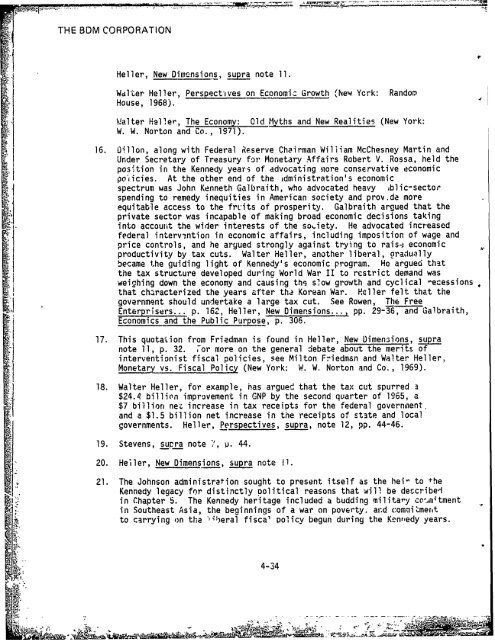policy - The Black Vault
policy - The Black Vault
policy - The Black Vault
You also want an ePaper? Increase the reach of your titles
YUMPU automatically turns print PDFs into web optimized ePapers that Google loves.
THE BDM CORPORATION<br />
Heller, New Dimensions, supra note 11.<br />
Walter Heller, Perspect'ives on Economic Growth (New Ycrk:<br />
House, 1968).<br />
Random,<br />
Walter Heller, <strong>The</strong> Economy: Old Myths and New Realities (New York:<br />
I' 16.<br />
W. W. Norton and Co., 1971).<br />
Dillon, along with Federal Reserve Chairman William McChesney Martin and<br />
Under Secretary of Treasury for Monetary Affairs Robert V. Rossa, held the<br />
position in the Kennedy years of advocating more conservative economic<br />
"policies. At the other end of the idministration's economic<br />
spectrum was John Kenneth Galbraith, who advocated heavy ,blic-sector<br />
spending to remedy inequities in American society and prov.de more<br />
equitable access to the fruits of prosperity. Galbraith argued that the<br />
private sector was incapable of making broad economic decisions taking<br />
into accouiit the wider interests of the sod.ety. He advocated increased<br />
federal intervintion in economic affairs, including imposition of wage and<br />
price controls, and he argued strongly against trying to raiseý economic<br />
productivity by tax cuts. Walter Heller, another liberal, gradually<br />
became the guiding light of Kennedy's economic program. He argued that<br />
the tax structure developed during World War II to restrict demand was<br />
weighing down the economy and causing ths slow growth and cyclical -ecessions<br />
that characterized the years after tha Korean War. Heller felt that the<br />
government should undertake a large tax cut. See Rowen, <strong>The</strong> Free<br />
Enterprisers... p. 162, Heller, New Dimensions.... pp. 29-36, and Galbraith,<br />
Economics and the Public Purpose, p. 306.<br />
17. This quotation from Friedman is found in Heller, New Dimensions, supra<br />
note 11, p. 32. -or more on the general debate about the merits of<br />
interventionist fiscal policies, see Milton Friedman and Walter Heller,<br />
Monetary vs. Fiscal Policy (New York: W. W. Norton and Co., 1969).<br />
18. Walter Heller, for example, has argued that the tax cut spurred a<br />
$24.4 billion improvement in GNP by the second quarter of 1965, a<br />
$7 billion nez increase in tax receiDts for the federal government.<br />
and a $1.5 billion net increase in the receipts of state and local<br />
governments. Heller, Perspectives, supra, note 12, pp. 44-46.<br />
19. Stevens, supra note 7, p. 44.<br />
20. Heller, New Dimensions, supra note 11.<br />
21. <strong>The</strong> Johnson administration sought to present itself as the hei- to the<br />
Kennedy legacy for distinctly political reasons that will be described<br />
"in Chapter 5. <strong>The</strong> Kennedy heritage included a budding military co•,,iatment<br />
in Southeast Asia, the beginnings of a war on poverty. and c:omnvi'merit<br />
to carrying on the '1beral fiscal <strong>policy</strong> begun during the Kenrnedy years.<br />
"4-34<br />
144
















